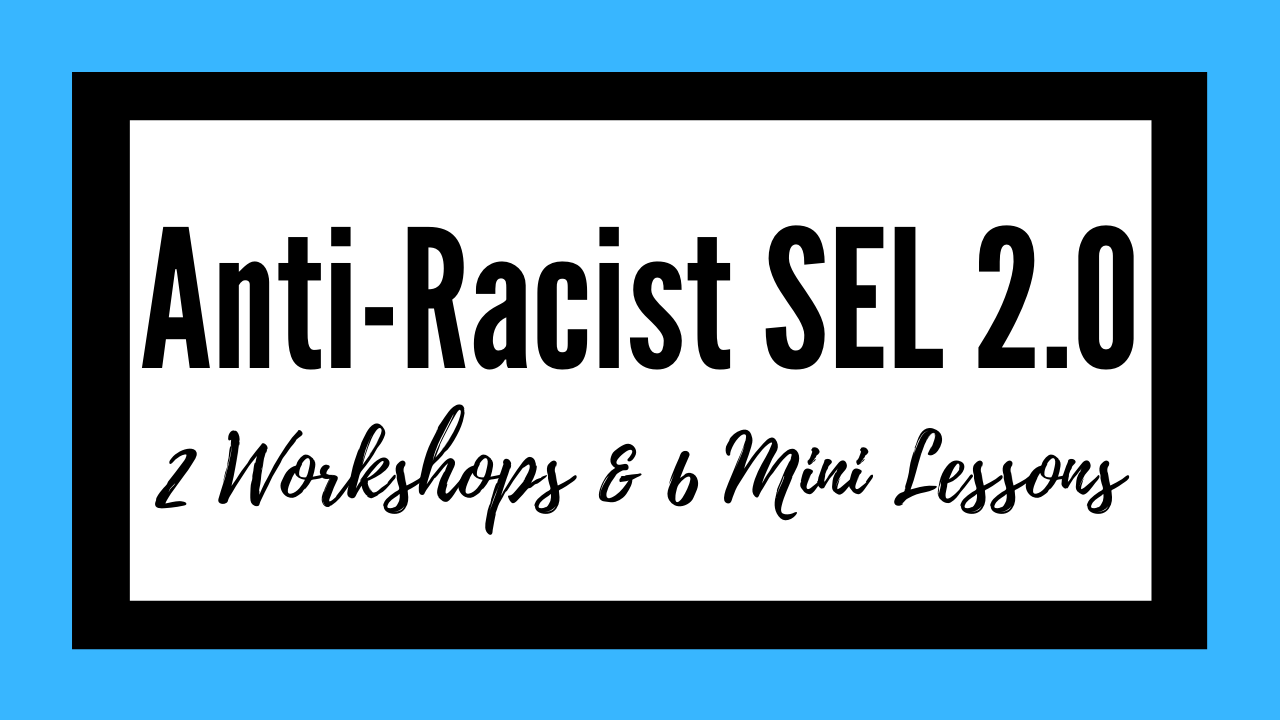Anti-Racist SEL Guide 2.0
6 Mini-Lessons & 2 Educator Workshops

Social-Emotional Learning (SEL) can be a lever for equity and anti-racist co-liberation, or it can be a tool of enforcing the status quo of racism.
Building off our introductory Anti-Racist SEL Package, Anti-Racist SEL 2.0 offers SIX new mini-lessons, ONE online workshop, and a LIVE working session, providing real time support and feedback.
PURCHASE NOWLive Working Session
Get the personalized support you need to incorporate Anti-Racist SEL into your curriculum.
Online Workshop
Discover the nuances between DEI and SEL, and begin leveraging the best of both in your work.
6 Mini-Lessons
Downloadable mini-lessons that can easily be customized to meet the needs of your students and classroom.
Overview
To best support you, we will be offering one LIVE working session and one asynchronous workshop.
LIVE Working Session
-
This session is more than a training; it is a hands on workshop, where you can begin to integrate explicit and intentional anti-racist SEL practices into your pre-exisiting or new curriculum!
- August 11, 2021 at 12pm EST
- Additional dates will be added this fall
Asynchronous Online Workshop
- DEI vs. SEL: Moving from a Deficit to an Abundance Model and Centering Equity through SEL Work (approx. 45 min)
This comprehensive package also includes six downloadable mini-lessons with educator tools including objectives, guiding questions for educators to ask, and relevant materials.
Lesson 1: Intersectionality
-
This lesson breaks down an oft-cited concept, intersectionality, by turning Kimberlé Crenshaw’s original paper into a role play that allows for deeper understanding.
Lessons 2 & 3: Storytelling
-
These two lessons utilize methods from Anna Deavere Smith to share one’s own story, listen actively, and to carry another’s story.
Lesson 4: Leadership & Empathy
-
This lesson helps students reimagine leadership in a more inclusive and empathetic way.
Lesson 5: What is Abolition?
- This lesson probes the imagination around what abolition could mean.
Lesson 6: Self Advocacy
- This lesson helps students develop their abilities to self advocate, while identifying and responding to their peers' abilities to do so.
Accessible to All
In an effort to ensure that this critical work is accessible to all, we have scholarships available to educators who cannot afford to attend at this time. To request a scholarship, please click here.
To purchase just the LESSONS ONLY package at a reduced rate of $175, click here.
Meet Our Content Curators
Jill Leahy (she/her) is a passionate educator currently working in the Prevention & Intervention department at Seattle Public Schools. She previously worked as the Associate Director of Diversity & Community at University Prep, as well as for education non-profits focused on educational equity in public education. Jill received her BA in Finance and Business Management, but ventured far from the investment world directly following college. She is a board member of The Washington Bus, and has worked with Equity Matters.
Emily Schorr Lesnick (she/her) is a white facilitator and theater maker in Seattle, WA (Duwamish land). She has worked in independent schools as a teacher, student advocate, and administrator, for over 10 years. Emily's training is in educational theater and cultural studies. She is a member of GLSEN's Educator Advisory Committee and a co-creator of How We GLOW, a piece of interview theater exploring lgbtq+ youth identity that has been performed across the country and world. Emily’s work has been featured in The New York Times, The New Yorker, NBC News, Parent Map Magazine, ArtsPraxis Magazine, The Huffington Post, and NAIS Magazine and Blog. With Mary Padden, she co-curates an anti-racist accountability email protocol with hundreds of recipients, moving from optical allyship to ongoing co-liberation. She also offers courses on Anti-Racist SEL and White Anti-Racist Accountability through The Institute for Anti-Racist Education.
Together, Jill and Emily developed a comprehensive DEI SEL framework and curriculum to foster critical connections rooted in anti-racism.

